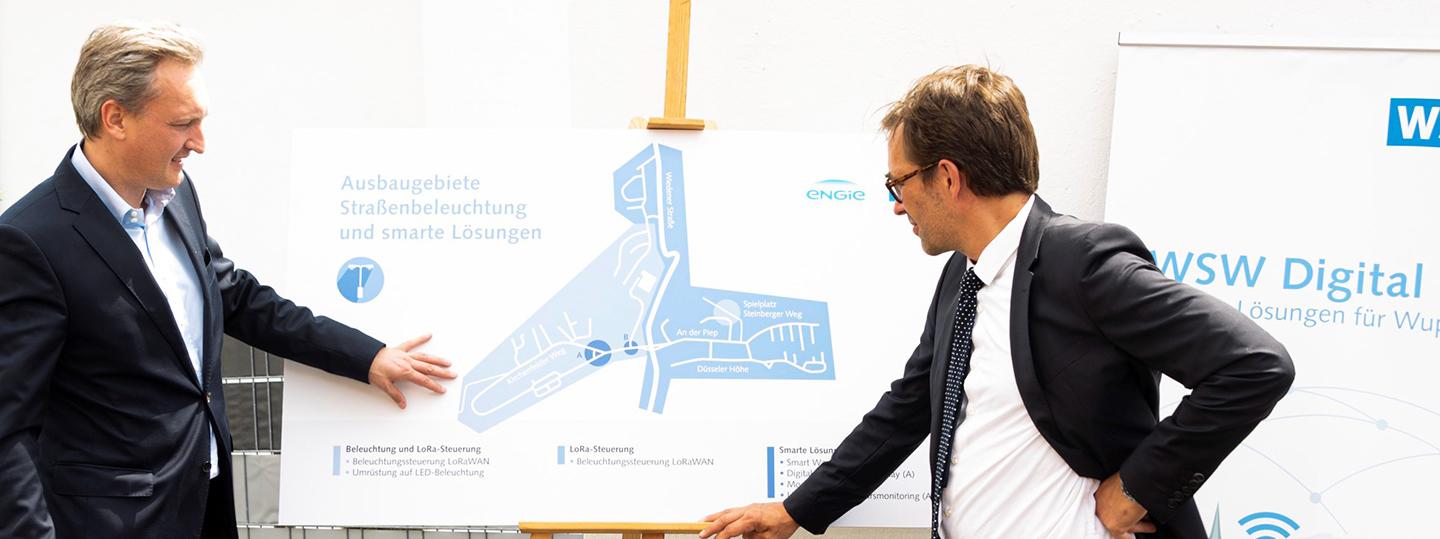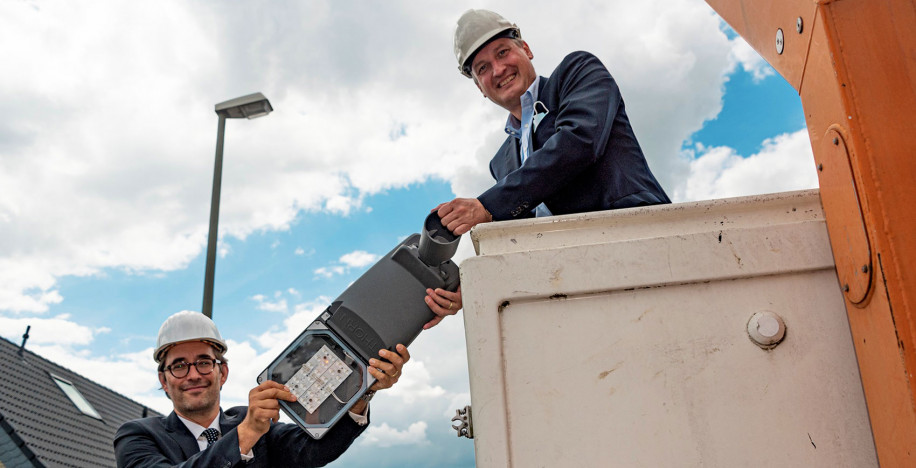
Cooperation between ENGIE Deutschland and the Wuppertaler Stadtwerke (WSW): Street lights that think along
Cologne/Wuppertal - "In the connected city, street lamps are more than lighting; together with its partner ENGIE Deutschland, Wuppertaler Stadtwerke (WSW) want to redefine the street lamp. A pilot project for this purpose was launched today in the Schöller/Dornap neighborhood in Wuppertal. The goal: to use intelligent sensors and controls not only to save energy, protect the climate and make sidewalks safer, but also to provide citizens with environmental data.
Electricity meters that send consumption data online, mobile apps that provide real-time information about bus departure times and disruptions, samples that measure water quality to separate wastewater and rainwater in the sewer system – public infrastructure is becoming increasingly digital. These data-based technologies are becoming increasingly important for WSW. "Digital solutions will make us more efficient and effective in all our business areas and thus also more customer- and citizen-friendly," explains Markus Hilkenbach, CEO at WSW. "We see ourselves not only as a provider and operator of local transport in Wuppertal, but as a digital infrastructure service provider," he says, describing his company's role. In this role, the municipal utility intends to drive forward the smart city strategy of the city of Wuppertal.
More quality of life, less CO2 emissions
Wuppertal's Mayor Dr. Uwe Schneidewind adds: "Projects like this clearly show that ecology and economy do not contradict each other, but set common goals in many areas. I am convinced that such networked systems will play a very important role in a future climate strategy. I am very pleased that the Wuppertal municipal utilities are bringing such a pilot project to Wuppertal." The project is implemented in cooperation with WSW and ENGIE. "As a long-standing partner of WSW, we are pleased to be taking a step toward the future in Wuppertal with the joint field test. We will work together to find new solutions through smart lighting and sensor-based technologies to improve the quality of life in the city and reduce the CO2 footprint," says Marcus Sohns, Head of Strategic Cooperations at ENGIE Deutschland.
LoRaWAN: On the way to the "Smart City Wuppertal"
Today, Wednesday, July 7, WSW CEO Markus Hilkenbach and Marcus Sohns, Head of Strategic Cooperations at ENGIE Deutschland, presented a joint digital project in the Schöller/Dornap district of Wuppertal. In the quarter in the west of the city a "thinking" street lighting has been installed. 224 street lamps in Schöller are digitally networked. This is done by the LoRaWAN, the "Long Range Wide Area Network", whose transmitters have a long range and at the same time are particularly energy-efficient. In this way, the lamps are controlled in order to better illuminate hazardous areas, for example. However, the sensor system installed in the poles can do much more. Measuring sensors provide environmental data on temperature, air quality or noise pollution. The LoRaWAN allows data collection and exchange across the entire city area. The street lamps – there are around 31,000 of them in Wuppertal – are ideal locations for measuring sensors and transmitting devices. The LoRaWAN technology is therefore a key technology for the "Smart City Wuppertal". In Schöller/Dornap, WSW and the city want to gather further insights into the use of technology, which can then be used elsewhere.
ENGIE and WSW: Together for the future
WSW uses the concept and technology of ENGIE Deutschland for the field test. The specialist for technology, energy and service accompanies cities and companies in their transition to climate neutrality. Especially for cities, which are an important lever for the success of the energy transition, the ENGIE Group has been working for decades on hardware and software solutions for intelligent lighting management and sensor-based services based on them. With 170,000 smart lighting points worldwide, ENGIE, partner of WSW Energie &Wasser AG since 2009, is one of the leading companies in smart city applications.

About Wuppertaler Stadtwerke (WSW)
With its subsidiaries, the WSW Group covers energy supply, drinking water production, public transport, urban drainage, energy services, digital infrastructure and waste management. With around 3,000 employees, the WSW Group is one of Wuppertal's largest employers.
ENGIE Deutschland GmbH